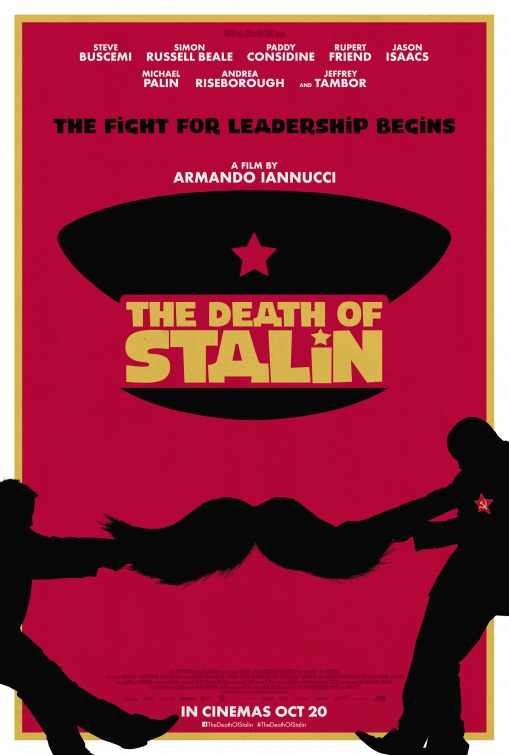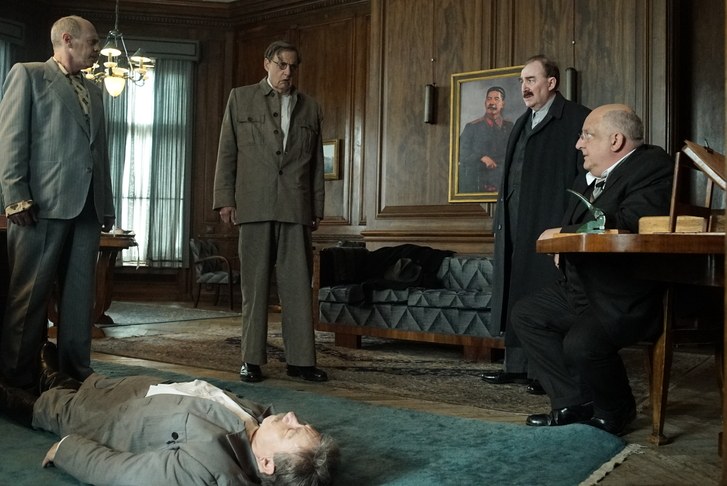The Death of Stalin (2018)


SHOULD I SEE IT?
YES
Nominated for two BAFTAs in 2017, Armando Iannucci's rapid-fire, take no prisoners satire is going to make fans of "Veep" and In The Loop very, very happy.
This is, without a doubt, going to remain one of the finest screenplays of 2018.
The performances come from non-Russian, American and British actors, essentially just playing themselves, and the mix of improvisation and rapid-fire dialogue wins almost every single time.
NO
This type of comedy can take all the air out of the room for people not prepared for the dense historical dive and the constant barrage of one-liners and cutting, biting satire.
No matter how good a movie this is, the premise is going to be limiting for a wider audience.
Some have found the idea of a comedy around the fall of Stalinism not very funny at all.
OUR REVIEW
In Armando Iannucci's The Death of Stalin, Russian dignitaries attempt to come together to determine the direction of the Soviet Union following the death of Soviet Premier Joseph Stalin in 1953. Under dictatorial rule for more than three decades, a power grab breaks out among Nikita Khrushchev of Moscow, Lavrentiy Baria, the head of NKVD - Russian Internal Affairs, and Stalin's General Secretary, Georgy Malenkov, as well as with other members of a hastily assembled Central Committee.
That may sound simple enough, but through the filter of Iannucci, this quickly degenerates into a haven of inspired lunacy.
Iannucci is the creator of the Emmy-winning "Veep" and shared an Oscar nomination for Best Adapted Screenplay for 2009's In The Loop. His pencil remains ever so sharp and jagged.
From the very beginning, when Stalin (Adrian McLoughlin) orders a copy of a classical music performance he listened to on Radio Moscow, and a producer (Paddy Considine) is forced to scramble to convince his musicians to recreate the concert exactly as they played it before, we see that Iannucci is in peak form from the very opening moments of his latest unforgiving satire.
As we are introduced to the main players, we see Steve Buscemi star as Khrushchev, Jeffrey Tambor as Malenkov, and the fantastic Simon Russell Beale as Baria. Elsewhere, familiar non-Russian actors populate the movie and the actors are allowed to use their normal speaking voices to improv and riff with one another. Also, there is something to be said about seeing Steve Buscemi with subtle prosthetics, in a fat suit, playing Nikita Khrushchev with a snappy, Brooklyn accident.
Playing recklessly with facts throughout the film, Stalin suffers a cerebral hemorrhage and is still alive, but the aforementioned Committee convenes and planning for the future of the Soviet Union begins. Along the way, Iannucci directs the film at a caustic pace and we have narcissism, ego, and hubris rampantly on display. Though a pall hangs over his appearance here, Tambor shines as Malenkov, whose toupee, girdle, and makeup keep him a wobbling, doddering mess. At one point, he calls for a show of hands for him to become the new..."well, you know..." (he hesitates calling himself the new Premier).
Of course, preceding this is a bickering argument, where committee members are trying to decide what they are voting on, what the procedures are, and for this crucial vote, Malenkov has to encourage people to raise their hands. Half-heartedly a couple people oblige.

It should be noted that Russia banned The Death of Stalin, as did a few other countries of the former Soviet Union. To put it mildly, the movie is not exactly a ringing endorsement of Mother Russia. As the silliness amplifies and the barbs get sharper and cause deeper and deeper wounds, I was struck by how, underneath my chuckling and laughter, a sense of real-world panic began setting in.
As over-the-top as all of this seems to be, Iannucci finds parallels to the toxicity of our political world today. History tells us that Malenkov would essentially be a de facto leader, with the support of Baria, but it would be Khrushchev that would shift the country politically and steer it away from Stalin's policies, governing as the First Secretary of the Communist Party for nearly a decade.
So as we laugh at the more ludicrous nature of these scenes in the film, Iannucci offers a sobering look at how people covet power, and how easy it is for them to feel entitled to possess it. Throughout the film, we see people shed morality like clothing they toss on a floor, and do whatever it takes to seize power. We also get numerous examples of how reckless people can be once they believe they have no one to answer to but themselves.
However, let it be known that The Death of Stalin is very, very funny. Arriving randomly throughout the movie are a bevy of cameos and drop-ins of varying levels of absurdity. When Stalin passes away, his daughter Svetlana (Andrea Riseborough) arrives with brother Vasily (Rupert Friend, delightfully nutty), who agitates everyone. Jason Isaacs also shows up as Georgy Zhukov, the leader of the Red Army, whose entrance into the film, is bigger than life and perfectly pitched for the arrogance already on display.
There's a lot to take in here, as Iannucci plays around with #FakeNews and takes some loose liberties with Russian history and international diplomacy. However, you do not need to have a deep knowledge of Soviet history to be thoroughly entertained by this.
I, for one, had a ball with Death of Stalin. Iannucci aggressively directs the film, the acting is stellar, the screenplay and improvisation work seamlessly together, and you just have to tip your hat to a man who always seems to find humor at times when laughter can feel so difficult.
CAST & CREW
Starring: Steve Buscemi, Simon Russell Beale, Jeffrey Tambor, Paddy Considine, Rupert Friend, Jason Isaacs, Michael Palin, Andrea Riseborough, Adrian McLoughlin, Olga Kurylenko, Paul Whitehouse.
Director: Armando Iannucci
Written by: Armando Iannucci, David Schneider, Ian Martin, Peter Fellows
Adapted from the graphic novel "La mort de Staline (The Death of Stalin)" by Fabien Nury and Thierry Robin.
Release Date: March 9, 2018
IFC Films
